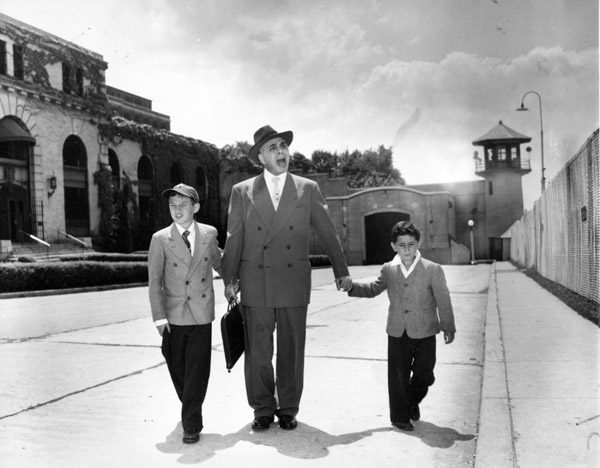In conjunction with the film clips and still photos Ms. Meeropol has found to illustrate these narratives, her interviews remind us of a time when thousands of young Jewish-Americans proudly dedicated their lives to the cause of universal social justice. Coming of age during the Great Depression of the 1930s, they were determined to end the poverty and oppression which surrounded them. They organized, marched, and fought for better working conditions and social services. Their enemy was never the United States government per se, it was always the plutocracy.
Were they idealistic to a fault with respect to the Soviet Union? Without doubt. Did they play a role in making our country a better place in which to live? Yes again. Without this context, it is impossible to understand why the Rosenbergs did what they did, as well as how they had the fortitude to endure once they were singled out, tried, and sentenced to death.
We will probably never be 100 percent certain of the facts of the case, but it appears likely that Julius Rosenberg provided our wartime allies in the Soviet Union with non-atomic military intelligence during World War II, and that Ethel knew about this even though she was not personally involved in his activities. What they were actually charged with, in 1950, was “conspiracy to commit espionage,” with the apparent goal of forcing them to name other names higher up. In the court of public opinion, however, they were damned for “stealing the secret of the atom bomb,” thereby endangering the survival of the United States during the Cold War.
The Rosenbergs’ friends are one half of Ms. Meeropol’s story; their families constitute the other half. But while the friends are out-going, loquacious, and thoroughly individuated, family members are almost invisible, even in film clips. History books tell us that Ethel Greenglass had three brothers and Julius Rosenberg was one of five children, but neither family wants anything to do with the Meeropols. Ms. Meeropol does her best to track her cousins down and solicit their participation, to no avail. She shows herself on the phone working off of two hand-drawn family trees, but she never shows us any of the names or tells us exactly who she is talking to at any one time. Their absence therefore becomes their identity.
Finally one man in early middle-age agrees to see her. She identifies him verbally as “Baron Roberts,” son of Julius’s brother David. Ms. Meeropol flies to an unnamed city to meet with him in his comfortable suburban home. He is astonished when she tells him that none of the other cousins will speak with her, even off camera. He cries and she comforts him. Although the trigger events happened long before any of them were born, Ivy and
Baron share a moment of sorrow for all the relatives who still live with their conflicted feelings.

Emanuel “Manny” Block, the Rosenbergs’ attorney, with Michael & Robbie
at Sing Sing. After the Rosenbergs were executed, the boys were adopted
by Abel & Anne Meeropol.
(Associated Press – 1953)
Is “Rosenberg” a name to be proud of or a name that carries shame? This is the question Ms. Meeropol asks in attempting to assess the consequences of the way her grandparents chose to live and die. The Rosenberg friends seek the light. They have no fear of the past, talk honestly about the time they served in prison, and still believe in the justice of their old causes. The Rosenberg and Greenglass families hide in the shadows. Ethel’s younger brother David Greenglass, the man whose testimony did the most to convict her, is shown in disguise in recent clips from the CBS newsmagazine 60 MINUTES II. Over eighty now, he lives under a false name, in total anonymity. “Because of the position Ethel and Julius took, we [the Meeropols] all get to live a life where we’re proud,” concludes Ms. Meeropol in her final on camera conversation with her father Michael.
In the post-9/11 world, we live once again in a time of fear and danger. What we do now has consequences. Someday each one of us will look back at this time, and we will think about what we did or didn’t do, what we said or didn’t say, how we voted or didn’t vote. It is impossible to watch this film without asking oneself: will I be proud or will I be ashamed? Without ever defining a target, this is a question Ivy Meeropol aims straight at the heart of the Jewish-American community.
© Jan Lisa Huttner (6/1/04)
FF2 NOTE:
This article is a slightly expanded version
of the review originally published
in the June 2004 edition of the
WORLD JEWISH DIGEST
(Volume 1 Number 9)
& is posted here with their permission.
For WJD subscription information:
Call 312.332.4172 extension 42
or
Fax 312.332.2119
Follow this Link to related articles on the
HBO
website.
Follow this link to a related article in the
NEW YORK
TIMES.
